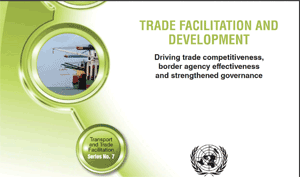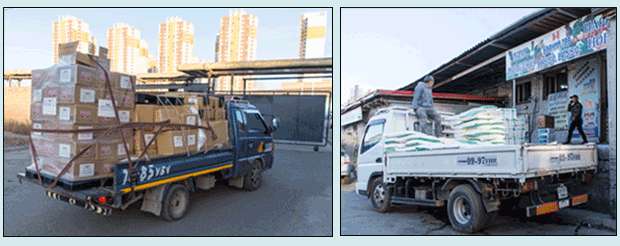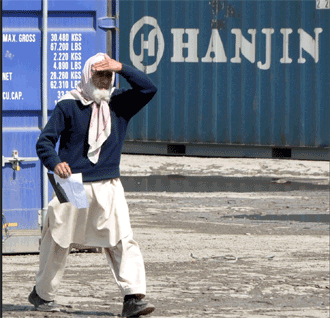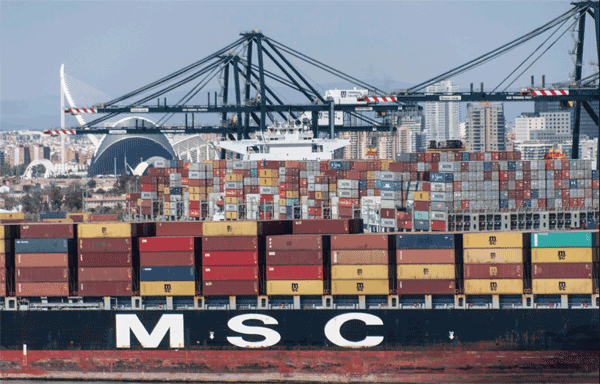Dr. Jan Hoffmann is Chief, Trade Logistics Branch
in the Division on Technology and Logistics at UNCTAD.
In different capacities through our careers, I have been able to meet with
Jan Hoffmann several times. Becoming acquainted with Jan has been both a privilege and a discovery for me.
If
one looks at the assembly of impressions and observations Jan has been able
to put together, starting from his oblique way of looking at international
trade in his worldwide journey through haircuts,
one soon understands that one is dealing with a strongly original thinker.
In the interview you will also understand that the imaginative thinker contained
in his genes manages to easily comply with the strict requirements of international
diplomacy, and this is an accomplishment indeed.
Gusto In Forschung
However, Dr. Hoffmann was not born a civil
servant, his gusto in “Forschung” (in English: Research) is
probably the engine behind his choices, which brought him from his family
tramp shipping business Hoffmann Shipping, based in Horneburg, Germany,
to many other contiguous interests: import-export agent, seafarer, translator,
consultant and assistant professor, before joining the United Nations.
Despite the contingency and perhaps even
because of it, in a recent conversation Jan and I have come to talk and
exchange views about UNCTAD’s publications regarding trade in the
pandemic.
MS: Jan,
how positively do you consider the fact that eight UN agencies have recently
united in a joint statement to alert governments on the risk of losing
out on logistics connectivity due to COVID19? Was is difficult to reach
consensus?
JH: The
COVID-19 crisis has brought us closer together. The tremendous challenges
posed by the pandemic to the logistics of international trade require
collaboration among the various relevant UN agencies. It was not difficult
to reach basic consensus on the key points and objective of the statement.
Unsurprisingly there was some back-and-forth about the exact wording,
and sequencing of issues. The final compromise joint statement was longer
and wordier than the initial draft.
Need To Learn And Adapt Quickly
 MS: In the beginning the document draws a rather scary picture
of the impact of the pandemic on trade and logistics. Is this recent impact
showing that governments should have invested more to protect and improve
logistics infrastructure and invest more in digitisation and technology
to ensure connectivity? MS: In the beginning the document draws a rather scary picture
of the impact of the pandemic on trade and logistics. Is this recent impact
showing that governments should have invested more to protect and improve
logistics infrastructure and invest more in digitisation and technology
to ensure connectivity?
JH: It
is always easy to make recommendations of what could have and should been
done differently with hindsight. Overall, the initial reactions of governments,
aiming at protecting their workers, officers at border agencies, and populations
are fully understandable. It is important, though, that governments learn
and adapt quickly.
There are many solutions in the area of trade
facilitation that help achieve both: protect populations and at the same
time make trade easier. Also, there are many areas where trading partners
can benefit from more collaboration and exchange of data, the mutual recognition
of tests and certificates, and in general regional or global standards.
Lessons In History
MS: Regarding
these standards, you and I know how long this discussion has taken, starting
back at the G7 in the ’90’s and even earlier. Is there an
enhanced role for UN agencies to publish and persuade other governmental
agencies, e.g. Customs, to take stock on the UN standards that are already
available for free?
JH: As
we advance with digitalization, I think we can learn from the history
of the ISO container, i.e. the box, which was developed by the private
sector, in the guise of a trucking entrepreneur in the United States.
Only after the dimensions and individualities of the TEU became first
national, and then global standards, did the container revolution take
off. Along those lines, I believe that private sector initiatives towards
standardising the exchange of digital information for transport –
be it block chain solutions, or initiatives towards the digitalization
of container shipping – are positive. But it will be important that
in the long term common standards are set and adopted. There is clearly
a role for organizations such as ISO, UN/CEFACT and the WCO.
MS: The
UN joint statement includes the request to “remove any unnecessary
regulatory obstacles to post-pandemic recovery”, which sounds as
minimum common sense. This being said, those reacting more efficiently
may see the consequences of the pandemic also as competitive advantage.
History shows that this is not a viable way forward. Do you think Social
Media are doing enough with their huge persuasive powers to make cooperative
behaviour collectively achievable or should they do more in this direction?
JH: The
social media platforms certainly have a responsibility to avoid further
polarization, which in turn is among the driving trends for populism and
protectionism.
I give you a fitting example: I am convinced
that Brexit is bad news for Britain, Europe and the world. But then, I
am biased and because I am biased, I read and receive news and feeds and
posts and tweets that confirm my contrary view. The same of course also
happens for those in favour. The press, Google, Facebook and LinkedIn
are smart enough to forage my confirmation bias. We all increasingly see
what we want to see, which helps to confirm our views. Once you are inside
an echo-chamber, you only see information that confirms your view.
MS: Considering
the power Social Media seem to have even on governments, is there a role
for the UN to lead the concert of voices emerging from social media, which
has been so far pointing in all possible directions, some completely counterproductive
in dealing with a pandemic . . .?
JH: This
question lands precisely on the topic I have dealt with in an interview
with TradeWinds. If you make me start speaking about conspiracy theories,
etc. I can get really angry . . . We easily overestimate
our own capacity and knowledge. In our own mind, we are all above average,
be it drivers, lovers, professors, etc. Ignorance is a disease that lurks
in unexpected quarters. The less you know, the more you are convinced
of what you think is knowledge.
Politicians are convinced they can control the
ghosts they conjure, but in the end then cannot. I do not wish to call
names, but populist politicians may find themselves in the same position
as the Sorcerer's Apprentice, who cannot tame the forces he had conjured
up. Unfortunately, mass and social media can amplify the damage. Investing
in mutual understanding and real knowledge is the only solution and this
is precisely what the UN stand for.
MS: So,
what could and should policy makers do, in the long term?
JH: First,
in my view, a key long-term starting point is education. Teach science
and scientific methods at school. Populism thrives on misinformation and
ignorant voters.
A policy maker (and a voter, too) should not
overestimate his or her own knowledge and capabilities. Recruiting critical
advisers and surrounding oneself with yes-men should be avoided with a
view to a long and rewarding political life, rather than a short lived
exit poll success.
Building strong institutions and constitutions
should be the objective. I am not in principle against direct democracy,
but allowing short term moods to create long-lasting effects should be
balanced with strong political constitutions and institutions over time.
MS: Let
us go back to the roots, UNCTAD has always considered the pivotal importance
of logistics for international trade; the cooperation with FIATA in this
area has been quite remarkable in these years. How valuable is industry’s
contribution, such as FIATA’s, to the work of agencies such as UNCTAD?
JH: Yes.
We have many years of collaboration with FIATA, working on joint events,
advocacy, and also capacity building programmes. We have common interest
to professionalize the freight forwarding industry in developing countries.
And the FIATA leadership has been very constructive in promoting trade
facilitation reforms, and encouraging its members to also join efforts
at the national level, for example on the issue of logistics connectivity.
 |
MS: The
discussion on the SDGs (sustainable development goals) was already active
at the beginning of this decade. FIATA was busy promoting logistics connectivity,
one of the first international organizations to do so, as early as 2012
(after the appropriate internal deliberations, two open letters were sent
to the relevant UN assemblies in 2013 and 2015).
What seems pretty obvious today was then maybe taken too early, too soon?
Your comments on this idea?
JH: Yes,
FIATA has been very supportive in improving logistics performance and
connectivity. FIATA also supported the World Bank in the development of
the Logistics Performance Index (LPI), which lists the perception of the
users in their respective countries, and from UNCTAD we have on several
occasions shared our work on the Liner Shipping Connectivity Index (LSCI),
which we developed in 2004 already, at FIATA events and conferences.
MS: With
the pandemic in our court, are the SDGs really at risk now in your view, although the SDGs do not specifically
mention logistics connectivity among the list of the SDGs?
JH: Although
there is no dedicated SDG on transport or logistics, there are many SDG
targets that are relevant for international trade and its transport services.
Accessibility, transport externalities,
trade diversification and many other targets benefit from efficient trade
logistics. This being said it is very important to maintain trade flows
at a certain level in order to avoid negative consequences in less developed
area.
 MS: FIATA published an explanation to establish the connection
between the approved SDGs and logistics connectivity for its members to
understand the opportunities. Then FIATA made suggestions to the Open Working Group on how the objectives could be achieved. How
much of this work would still be meaningful today in your opinion in addressing
the issues that emerge out of COVID19? MS: FIATA published an explanation to establish the connection
between the approved SDGs and logistics connectivity for its members to
understand the opportunities. Then FIATA made suggestions to the Open Working Group on how the objectives could be achieved. How
much of this work would still be meaningful today in your opinion in addressing
the issues that emerge out of COVID19?
JH: The
2014 submission was very timely and relevant. Today, in times of the COVID-19
pandemic, the push for further digitalization and dematerialization is
even more relevant. UNCTAD have recently published a document which contains a number of good suggestions to keep ships moving, ports
open and cross-border trade flowing, while ensuring that border agencies
can safely undertake all necessary controls to protect the population
from COVID-19. Facilitating trade and the transport of goods has become
more important than ever, to avoid logistics obstacles that lead to shortages
of necessary supplies or even isolation.
MS: I
am fishing for some good news here, Jan . . . Can you share any information
that suggests a positive development in the near future for our sector?
Can the first numbers after the summer tell us that trade is picking up
again?
JH: Actually,
yes. Trade in merchandise is picking up, as data on port calls shows us.
If you wish to read the full report, you can peruse the following link:
However, as the article itself says, there
is room for a cautiously optimistic outlook.
 |
Despite the numerous challenges, the maritime
transport industry has overall been able to weather the storm caused by
the COVID-19 crisis. The industry managed to continue operations and ensure
the delivery of essential goods as well as trade while at the same time
maintaining profitability. Strict capacity management ensured that freight
rates remained stable or even increased during the crisis, leading many
carriers to expect 2020 to be a profitable year.
The implications for shippers and trade of continued
cuts in ship capacity should however be monitored to ensure that the current
market concentration in liner shipping and the Alliances’ strategies
are supportive of a sustainable trade recovery.
I know FIATA has been particularly vocal
on these issues in recent times and its Working Group Sea is providing
good guidance to its members.
MS: Jan,
this is really a distinguished lecture, with your intelligent way of dealing
with a difficult topic. Let me thank you on behalf of the FlyingTypers for your flexibility and generous contribution. Please accept my very
best wishes for your present and future career. Please join me in wishing
all our readers good health and success in their businesses.
Marco Sorgetti |




